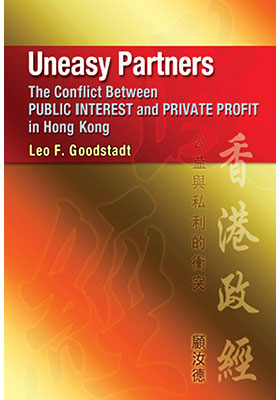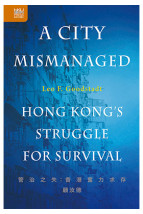Uneasy Partners
The Conflict Between Public Interest and Private Profit in Hong Kong
(官商同謀:香港公益與私利的矛盾)
ISBN : 978-988-8028-09-2
January 2005
368 pages, 6″ x 9″
Ebooks
Also Available on
In Uneasy Partners, Leo Goodstadt draws on his vast experience of government and business in Hong Kong to put forward a provocative and challenging account, part praise, part indictment, of how government and business in Hong Kong transformed a poor refugee community into one of the world’s great cities and created a hugely successful economy.
The core of the book is a penetrating appraisal of the often paradoxical partnership between government and business and its considerable political and social costs. The principal actors in the story are the colonial rulers who were prepared to sacrifice Britain’s diplomatic interests and the interests of British companies in order to ensure Hong Kong’s survival, and their chosen allies from the Chinese business elite.
British officials believed that economic growth and the survival of colonial rule depended on collaboration with Chinese capitalism and cooperation with China’s communist rulers. The book identifies how the community set limits to these relationships, preventing the blatant sell-out of the public’s wellbeing to British, Mainland or local business interests. It reviews how colonial officials defied London’s proposals for political and social reform, fought for economic and financial autonomy and refused to protect the pound sterling. It identifies Beijing’s financial gains from the colonial policies that provided China with a secure international business base throughout the Cold War. Other chapters assess the belated drive against wholesale corruption, the decline of British commercial conglomerates, the ascendancy of HSBC, and the contribution of businessmen from Shanghai.
The story goes on beyond the British departure and explains how the Chinese Government’s decision to retain the political system of the colonial era handicapped the new leadership in responding to the changing political and social expectations of the community.
“One may agree or disagree with him, but Goodstadt’s masterfully researched and entertaining book is compulsory reading for anyone who wants to understand the modern political and economic history of Hong Kong.” —Dr. Raymond Ch’ien, Executive Council Member 1992–2002, Chairman, MTRC, Executive Chairman, chinadotcom
“Leo Goodstadt is exceptionally well-placed to unravel the relationships between business and government in Hong Kong. As head of the Central Policy Unit, he had a key role in transforming the old colonial administration into a more accountable system of government. His unique knowledge informs this lively and often controversial exploration of how today’s Hong Kong has been created by Cantonese and Shanghainese entrepreneurs, the British hongs and the Government, each pursuing their sometimes divergent, sometimes parallel agendas.” —Professor Ambrose King, Professor of Sociology and former Vice-Chancellor, Chinese University of Hong Kong
“Leo Goodstadt’s original, masterly and carefully considered account of Hong Kong’s colonial rule and its baleful legacy is the best available. It is a roots and branch analysis of the failings of elitist and unrepresentative government as applied to a first world city.” —Professor Michael Yahuda, Emeritus Professor, The London School of Economics and Political Science and Visiting Scholar, The George Washington University
“A must read for all students of Hong Kong’s post war history. Indeed it is a fascinating story for all those who have had any association with Hong Kong. Leo Goodstadt tells his story like a surgeon cutting with the confidence of one who knows exactly what he is doing and with the authority of one who has really done his homework.
The mixture of different interested parties, from the elite locals, made up mostly of businessmen, the British hongs, the expatriate civil servants and their local counterparts, the British Government and its Foreign Office gurus, the mainland Chinese and last but not least the people of Hong Kong, makes for a drama that quickens the pace of this important and serious book and makes it immensely readable. It is nevertheless a sombre account of a rather sad story with endless missed opportunities to do the right thing.” —Simon Murray, CBE, former Group Managing Director of Hutchison Whampoa and Asia-Pacific Executive Chairman of Deutsche Bank






